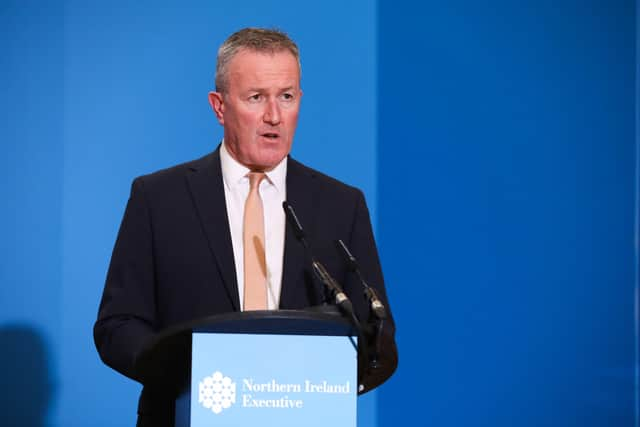Peter Robinson: Sinn Fein finance minister’s fiscal policy is to hold out his hand for more UK cash


Every Chancellor will present his financial statement in the best light and in the most positive manner. This budget should be treated in that context.
Given that many of the Chancellor’s comparisons were with 2018/19 rather than the last financial year because we are told “it is the most recent year for which data is available” we can expect that the differentials will be greater.
Advertisement
Hide AdAdvertisement
Hide AdYet even taking this into account it is hard to argue against the view that this was a very helpful and generous budget for Northern Ireland.


I only wish there had been a £1.6 billion budget increase while I had been in that post, I might have wanted more – what minister would not – but it is a huge additional contribution from the Exchequer toward Northern Ireland’s spending.
The extent of our need for support, as part of the United Kingdom family, can be seen in that England had a public sector deficit of 0.3% of GDP in 2018/19, compared to 7.7% in Scotland, 17.9% in Wales and 19.0% in Northern Ireland.
Without a redistribution of the UK’s resources to benefit Northern Ireland we would have a much lower standard of living.
Advertisement
Hide AdAdvertisement
Hide AdThe much lower level of revenue raised in Northern Ireland compared to the UK average means that our membership of the Union provides more than £5,000 in subsidy for every man, woman and child living here — every year.
That is a startling figure that the EU has never and would never contribute to our funding, and one that the Republic could never provide.
In social policy terms there will be many who would have different priorities and undoubtedly, we all might desire to see higher levels of social benefits, especially if someone else is paying for them. However, it would be extremely harsh and frankly dim-witted to look this gift horse in the mouth, yet not surprisingly our finance minister did just that and seems happier flogging the poor creature even though it makes him appear appallingly ungracious and barmy.
I realise that for Sinn Fein it is anathema to praise or thank “the Brits” for anything and it is probably a cause for expulsion from the ranks and banishment from republican circles — but really! Needless to say, there was an absence of tough questioning of Mr Murphy about how he would raise the additional cash to provide the level of services he claims to want.
Advertisement
Hide AdAdvertisement
Hide AdHolding his hand out for more appears to be his only fiscal policy.
He demands a greater level of public spending for Northern Ireland but ignores the fact that the government is spending £15,182 per capita here, which is more than anywhere else in the UK.
As the Institute for Government paper asserts, “the levels of deficit for Scotland, Wales and Northern Ireland implied by the current distribution of public money across the UK would not be sustainable if any of these nations were to leave the union … each of the UK’s three smaller nations would have a far higher level of public spending than revenues if they attempted to continue with current domestic policies after secession. The gap would be so large that it could not be sustained – at least, in Northern Ireland’s case, not without substantial ongoing transfers from the rest of Ireland.”
The salient figure for people to address is that while redistribution within the UK to Northern Ireland - taking account of spending after revenue has been subtracted - equates to 0.4% of the GB economy whereas it would account for 5.0% of the Irish economy. The Republic’s economy is not sufficiently large or robust and could not afford to finance subsidies on this scale. Only two outcomes are possible for Northern Ireland, stay within the UK or prepare for drastic reductions to public spending and have a much lower standard of living in a united Ireland.
Advertisement
Hide AdAdvertisement
Hide AdThe Institute having outlined the “running cost” of Northern Ireland then addressed the share of the UK’s accrued debt that Ireland would have to service as was the issue in the Scottish referendum. Nobody now could guess what amount this might be, but it would need to be serviced in addition to the public spending deficit which I have outlined.
No amount of fancy manipulation of the figures can remove these stubborn facts. I have seen spurious claims that suggest that spending on UK-wide issues like defence could be wiped out. Such nonsense. Defence spend in a united Ireland would escalate from its present level and I am not talking about the public order issues that might arise as a consequence of constitutional change.
These paragraphs deal only with the benefit of our fiscal union as part of the UK but for most of us our place within the Kingdom is about much more than that.
In the months ahead we shall take time to consider those other benefits.
Advertisement
Hide AdAdvertisement
Hide Ad• Other comment articles below and beneath that information on how to subscribe to the News Letter
• David Campbell Oct 29: We need to make plans for a proper celebration of NI at 100
• David Montgomery Oct 28: Put NI politicians at heart of the talks to resolve the dispute over the protocol
• Henry Patterson Oct 27: Terror is being legitimised in Basque Country as it is in NI
Advertisement
Hide AdAdvertisement
Hide Ad• Henry McDonald Oct 23: Absence of Queen at centenary service was spun beyond credulity
• Ben Lowry Oct 23:Centenary church service should have celebrated Northern Ireland
• Owen Polley Oct 25: Unionists need to match the relentless energy of nationalism
• Ruth Dudley Edwards Oct 26: Nasty article gloated over Sinn Fein centenary snub
Advertisement
Hide AdAdvertisement
Hide Ad• Peter Robinson Oct 15: Any unionist praising the Good Friday Agreement is a heretic
• Peter Robinson Oct 1: Doug Beattie should say to where he wants UUP voters to transfer
• Peter Robinson September 17: The party of Edward Carson and James Craig will now just lobby against the Northern Ireland Protocol
• Peter Robinson September 3: The Protocol will spread like a cancer through the blood and bones of the Union unless it is removed
Advertisement
Hide AdAdvertisement
Hide Ad• Peter Robinson August 20: We in Northern Ireland should understand the betrayal of the Afghan people
• Peter Robinson August 6: Hospitality has no enthusiasm for vaccine passports but they are better than being shut
——— ———
A message from the Editor:
Thank you for reading this story on our website. While I have your attention, I also have an important request to make of you.
With the coronavirus lockdowns having had a major impact on many of our advertisers — and consequently the revenue we receive — we are more reliant than ever on you taking out a digital subscription.
Advertisement
Hide AdAdvertisement
Hide AdSubscribe to newsletter.co.ukand enjoy unlimited access to the best Northern Ireland and UK news and information online and on our app. With a digital subscription, you can read more than 5 articles, see fewer ads, enjoy faster load times, and get access to exclusive newsletters and content.
Visit
to sign up
Our journalism costs money and we rely on advertising, print and digital revenues to help to support them. By supporting us, we are able to support you in providing trusted, fact-checked content for this website.
Ben Lowry, Editor